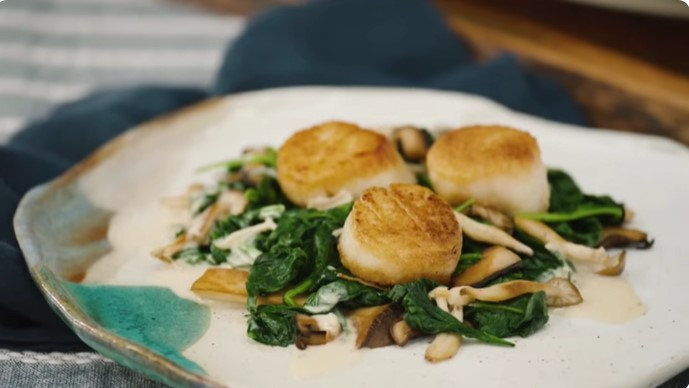Scallops Nutrition Facts
Scallops, known for their tender texture and subtle, buttery flavor, are a seafood delicacy enjoyed by many. Beyond their culinary appeal, scallops offer significant nutritional benefits, making them an excellent choice for those looking to enhance their diet with nutritious, low-calorie food. In this article, we will delve into the detailed nutritional profile of scallops, their health benefits, and address some Frequently Asked Questions to provide a comprehensive understanding of this delectable shellfish.

Nutritional Profile of Scallops
Scallops are not only delicious but also packed with essential nutrients. Here’s a detailed breakdown of their nutritional content per 100 grams of raw scallops:
- Calories: 69 kcal
- Carbohydrates: 3.18 g (1% DV)
- Fiber: 0 g
- Sugars: 0 g
- Fat: 0.49 g (<1% DV)
- Saturated fat: 0.13 g (1% DV)
- Monounsaturated fat: 0.05 g
- Polyunsaturated fat: 0.13 g
- Omega-3: 0.11 g
- Omega-6: 0.01 g
- Protein: 12.06 g (24% DV)
- Cholesterol: 24 mg (8% DV)
Vitamins
- Vitamin B12: 59% DV
- Choline: 12% DV
- Folate: 4% DV
- Vitamin B6: 4% DV
- Niacin (B3): 4% DV
- Pantothenic acid (B5): 4% DV
- Riboflavin (B2): 2% DV
- Thiamin (B1): 1% DV
- Vitamin D: <1% DV
- Vitamin A (RAE): <1% DV
Minerals
- Phosphorus: 27% DV
- Selenium: 23% DV
- Sodium: 17% DV
- Zinc: 8% DV
- Magnesium: 5% DV
- Potassium: 4% DV
- Iron: 2% DV
- Copper: 2% DV
- Manganese: 1% DV
- Calcium: <1% DV
Health Benefits of Scallops
High Protein Content
Scallops are an excellent source of high-quality protein, which is essential for muscle maintenance and repair, especially during weight loss efforts when muscle loss can be a concern. With 12 grams of protein per 100 grams, scallops offer a substantial amount of protein for a relatively low calorie count, making them a great option for those looking to increase their protein intake without consuming excessive calories.
Rich in Vitamins and Minerals
Scallops are particularly rich in Vitamin B12, providing 59% of the daily value per 100 grams. Vitamin B12 is crucial for maintaining healthy nerve cells and producing DNA. They also offer significant amounts of phosphorus and selenium, which are important for bone health and immune function, respectively.
Low in Fat and Calories
With less than 1 gram of fat and only 69 calories per 100 grams, scallops are a low-fat, low-calorie food that fits well into a balanced diet. The small amount of fat present includes beneficial omega-3 fatty acids, which support heart health.
Supports Cardiovascular Health
The omega-3 fatty acids in scallops, though present in small amounts, contribute to cardiovascular health by reducing inflammation and supporting normal heart rhythms. Additionally, the high levels of potassium and magnesium help regulate blood pressure and support overall heart function.
Potential Risks and Considerations
Allergies
Approximately 0.5-2.5% of the population in the United States has a shellfish allergy, which can include scallops. Symptoms of an allergic reaction can range from mild hives to severe anaphylaxis. Individuals with shellfish allergies should consult with a healthcare provider before consuming scallops.
Sodium Content
While scallops are nutritious, they do contain a significant amount of sodium (17% DV per 100 grams). High sodium intake can lead to increased blood pressure and related cardiovascular issues, so it’s important to monitor your overall sodium consumption when including scallops in your diet.
Environmental Contaminants
As filter feeders, scallops can accumulate toxins and heavy metals from their environment. It is crucial to source scallops from reputable suppliers who follow safe and sustainable fishing practices to minimize the risk of contamination.

Frequently Asked Questions
Are scallops good for weight loss?
Yes, scallops are an excellent food choice for weight loss. They are low in calories and fat while being high in protein, which helps keep you full and supports muscle maintenance.
How should scallops be cooked to retain their nutritional value?
Scallops can be cooked in various ways, such as searing, grilling, broiling, steaming, or boiling. To retain their nutritional value and avoid toughness, cook scallops for a short duration until they are opaque and firm.
Can people with high cholesterol eat scallops?
Scallops contain dietary cholesterol but are low in saturated fat. For most people, the cholesterol in scallops is unlikely to significantly impact blood cholesterol levels. However, those with specific dietary restrictions should consult a healthcare provider.
How often can I eat scallops?
Scallops can be included in your diet regularly, but it’s essential to balance them with other protein sources and ensure they are part of a varied and balanced diet.
What is the difference between bay scallops and sea scallops?
Bay scallops are smaller, sweeter, and more tender, while sea scallops are larger, slightly chewier, and often more expensive. Both types offer similar nutritional benefits.
By understanding the nutritional profile and health benefits of scallops, you can make informed decisions about incorporating this nutritious seafood into your diet. Always consider any dietary restrictions or allergies and consult with a healthcare provider if needed.





